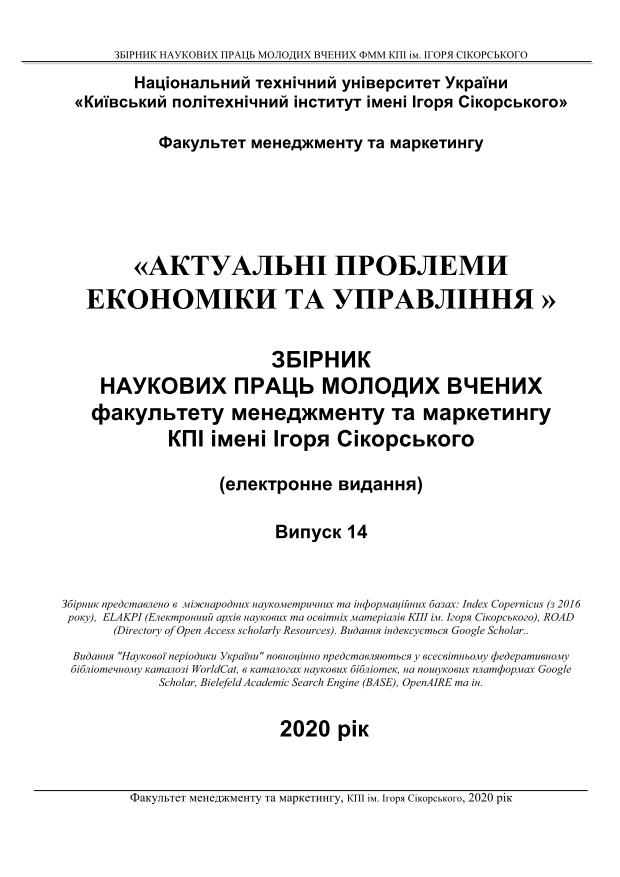APPLICATION OF THE INVESTOR'S PROBLEM TO FINANCIAL MARKET OF SECURITIES
Ключові слова:
investor problem, measuring risk, value at risk, risk managementАнотація
The article investigates the application of the investor problem to securities trading in single-period and multi-period models. The investor has to determine at stage t the sum he invests in the purchase of securities (shares or options), if from previous historical data he knows the distribution function of a random variable – the share price, provided that with in period t. The investor's income is a random variable at stage t. In addition, the investor knows the bank interest rates on both deposit and loan. The relevance of this study is of particular importance in a crisis; in particular, the study of the relationship between the optimal investment in securities (in terms of profit maximization) and the management and measuring of the risk of such investment comes to the fore. This problem can be solved by the existence of a close relationship between the optimal investment and the measurement of risk given by stochastic optimization. It is possible because the average value-at-risk AV@R is related to a simple stochastic optimization problem with a piecewise linear profit/cost function and maximal value is attained. The problem includes consideration of two possible scenarios: when the income at the end of the period is more than the investment at the beginning of the period and when the income is less than the investment and there is a shortfall. The result of the work is the formulation of four statements about the values of optimal investments in stocks and options in the single-period and multi-period models and about the potential maximum profits for such applying such a strategy. It turned out that the value of optimal investment can be directly expressed in terms of VaR of some probability level, and this level is expressed in terms of credit and deposit interest rates an characterizes the state of the national economic environment. The results of the theoretical study were illustrated on real financial data using two models of financial markets. In the first model, the stock movement obeys the geometric Brownian motion (GBM model). The second model was a model in which the movement of risky assets is described by generalized diffusion with a new fractal time (FAT model). The results of optimal investments for both models were compared with the fair price obtained by the Black-Scholes formula. The results of the study conducted in this work were used to develop recommendations for making decisions about optimal investments in securities (stocks, options) to obtain speculative income in stock trading.
Посилання
Pflug G., Römisch W. Modeling, measuring and managing. 2007. 286 p.
Dokuchaev N. Maximin setting for investment problems and fixed income management with observable but non-predictable parameters. Math.PR,2.2002. 22p.
Hull J. C. Options, futures, and other derivatives. 2015. 869 p.
Stepanov S. S. Stochastic World. 2013. 339 p.
Castelli F., Leonenko N. N., Shchestyuk N. Student-like models for risky assets with dependence. Stochastic Analysis and Applications, 35(3). 2017. 12p DOI: 10.1080/07362994.2016.1266945.
Shchestyuk N. Ocinka spravedlyvoi ciny opcioniv v modifikacijah modeli Hejdy-Leonenka. Mathematical and computer modelling. K-PNU, Ph-math sciences, 11. 2014. 13p
Cassidy D. T., Hamp J. M., Ouyed R. Pricing European options with a log Student’s t-distribution: a Gosset formula. Physica A: Statistical Mechanics and its Applications. 2010. 12 p.
Rockafellar R. T., Uryasev S. Optimization of conditional value-at-risk. Journal of Risk 2. 2000. pp. 21-41.
##submission.downloads##
Опубліковано
Номер
Розділ
Ліцензія
Редакція дотримується політики CC-BY.
© Авторські права авторів статей захищено відповідно до законодавства України
Розміщуючи матеріали у збірнику наукових праць автори погоджуються з правом редакції збірника розміщувати матеріали збірника в електронному вигляді на офіційному сайті збірника та інших електронних ресурсах відповідно до законодавства України.

